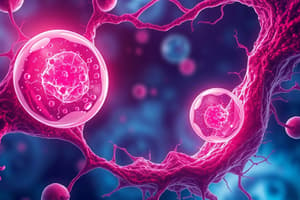Podcast
Questions and Answers
Which organelle is known as the cell's powerhouse, producing energy via cellular respiration?
Which organelle is known as the cell's powerhouse, producing energy via cellular respiration?
- Nucleus
- Endoplasmic reticulum
- Golgi apparatus
- Mitochondria (correct)
What is the main function of the Golgi apparatus in a cell?
What is the main function of the Golgi apparatus in a cell?
- Protein synthesis (correct)
- Genetic material storage
- Energy production
- Cellular respiration
Which process yields two genetically identical daughter cells essential for the growth and repair of the body?
Which process yields two genetically identical daughter cells essential for the growth and repair of the body?
- Mitosis (correct)
- Meiosis
- Endocytosis
- Cell differentiation
What is the main role of the nucleus in a cell?
What is the main role of the nucleus in a cell?
What process leads to the production of gametes with half the number of chromosomes?
What process leads to the production of gametes with half the number of chromosomes?
Which principle of cell theory states that all cells come from preexisting cells?
Which principle of cell theory states that all cells come from preexisting cells?
How do cells interact with one another through communication?
How do cells interact with one another through communication?
Which cellular function involves the transmission of signals to coordinate body movements?
Which cellular function involves the transmission of signals to coordinate body movements?
In cell biology, what do hormones and neurotransmitters primarily serve as?
In cell biology, what do hormones and neurotransmitters primarily serve as?
Which organelle is primarily responsible for waste removal in cells?
Which organelle is primarily responsible for waste removal in cells?
Flashcards are hidden until you start studying
Study Notes
The Fundamental Unit of Life: Diving into Cellular Worlds
At the heart of every living organism, from the tiniest bacterium to the most complex human, lies the cell. This fundamental building block of life performs a symphony of functions, all orchestrated by its intricate structure and components. In this article, we'll explore the four fundamental subtopics of the cell: cell organelles, cell division, cell theory, and cell function, putting the spotlight on the wondrous workings of life's tiniest domain.
Cellular Organization: The World Within a Cell
A cell is an enclosed membrane-bound structure containing a variety of specialized components, collectively known as cell organelles. Some prominent organelles include the nucleus, mitochondria, endoplasmic reticulum, and the Golgi apparatus—each boasting a specific role in the cellular machinery.
The nucleus is the cell's command center, housing the genetic material, DNA. The mitochondria is the cell's powerhouse, producing energy via cellular respiration. The endoplasmic reticulum and Golgi apparatus are involved in protein synthesis and modification.
Cell Division: Reproducing Life
Cell division is the process by which cells replicate, giving rise to new cells. This occurs through two primary types of cell division: mitosis and meiosis.
Mitosis yields two genetically identical daughter cells and is essential for the growth and repair of the body. Meiosis, on the other hand, produces gametes (sperm and egg cells) with half the number of chromosomes, enabling sexual reproduction.
Cell Theory: The Basis of Life
Cell theory is a cornerstone of biology, providing a framework for understanding the structure and function of cells. It consists of three main principles:
- All living organisms are composed of cells, either as individual units (single-celled organisms) or as aggregates thereof (multicellular organisms).
- Cells are the basic units of structure, function, and inheritance.
- All cells comes from preexisting cells via cell division.
Cell Function: Coordinated Activity
Cells perform a myriad of vital functions, including metabolism, waste removal, and communication. Cells interact with one another via direct contact or through chemical messengers, such as hormones and neurotransmitters.
Cells also communicate with their environment, responding to external stimuli and adapting to meet new challenges. For instance, a plant cell may alter its shape in response to gravity, while a nerve cell transmits signals to coordinate the body's movements.
The intricate balance of these cellular functions and interactions is what makes each of us unique, diverse, and complex. This hidden world of cells is indeed the fundamental unit of life, powering every organism's growth, repair, reproduction, and survival. do not contribute directly to the content of this article, as they are unrelated to cell biology and the central topic of the fundamental unit of life.
Studying That Suits You
Use AI to generate personalized quizzes and flashcards to suit your learning preferences.




